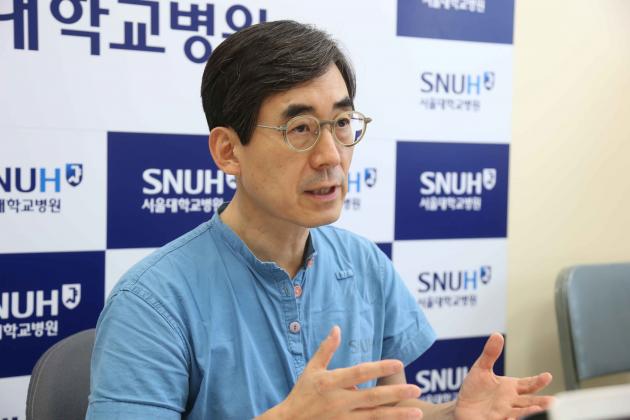Professor Kim Hyo-soo, the project director of Seoul National University Hospital’s (SNUH) research-centered hospital team, said the goal of the research-based project is to develop treatments for 10 diseases.

The 10 diseases are brain cancer, rheumatoid arthritis, burns, trachea damage, blindness, bone disease, cirrhosis, nephrosclerosis, B cell cancer and organ transplantation, Kim explained.
The Ministry of Health and Welfare (MOHW) had selected the hospital as a candidate for its "2018 Research Centered Hospital Unit,” earlier this month. The ministry will provide 2.5 billion won ($2.2 million) annually for nine years, or 22.5 billion won in total, to help finance the project.
“Our hospital plans to use the five original technologies we developed in the government’s cell therapy research project from 2006 to 2016,” Professor Kim said.
The five technologies mentioned by Kim are the patents on induced pluripotent stem cells (iPSC), mesenchymal stem cells (MSC), anti-fibrotic genes, angiogenic E/K/T genes and multi-target switchable chimeric antigen receptor (CAR).
“Our research team’s ultimate goal is not only finding a cure using our patents but also building a fusion bio-treatment platform for gene therapy, cell and organs,” Kim said. “Currently, the development momentum for each subject is pretty weak in Korea.”
Korea needs to catch up, as multinational pharmaceutical companies are investing many resources into developing future medications such as target cancer therapy and gene modification treatment, Kim added.
The hospital has partnered up with Gyeongsang National University Hospital (GNUH), while private companies such as CdmoGen and Yuhan Corp. plan to provide additional support.
Of the 10 diseases, GNUH will be responsible for finding treatments for rheumatoid arthritis, bone disease and nephrosclerosis, while SNUH will investigate the remaining seven illnesses.
SNUH plans to split the government funding and provide 625 million won annually for nine years, 2.5 billion won in total.
A total of 14 professors from SNUH and GNUH will participate in the project.
“If the research is completed, it will speed up the development of additional biotherapeutics from other hospitals and institutions by using our platform,” Kim noted.
The SNUH professor stressed his team’s ultimate goal is in commercializing the treatments discovered from the research and make people healthier and happier.
SNUH has introduced a “milestone system,” which will evaluate the value and environment for commercialization after they manage to collect a sufficient amount of non-clinical data.

